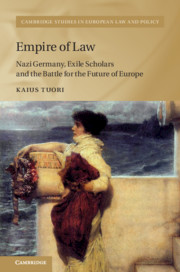(Source: CUP)
Cambridge University Press is publishing a book on the
formation of the European legal tradition before and after World War II.
ABOUT THE BOOK
European legal integration is often justified with reference
to the inherent unity of European legal traditions that extend to ancient Rome.
This book explores the invention of this tradition, tracing it to a group of
legal scholars divided by the onslaught of Nazi terror and totalitarianism in
Europe. As exiles in Britain and the US, its formulators worked to build
bridges between the Continental and the Atlantic legal traditions,
incorporating ideas such as rule of law, liberty and equality to the European
heritage. Others joined the Nazi revolution, which promoted its own idea of
European unity. At the end of World War Two, natural law and human rights were
incorporated into the European project. The resulting narrative of Europe, one
that outlined human rights, rule of law and equality, became consequently a
unifying factor during the Cold War as the self-definition against the
challenge of communism.
ABOUT THE AUTHOR
Kaius Tuori, University of Helsinki
Kaius Tuori is Professor of European Intellectual History at the Centre for European Studies, Faculty of Social Sciences, University of Helsinki. He is a legal historian and author of two monographs and numerous articles spanning the topics of tradition, culture, identity, memory and the uses of the past.
TABLE OF CONTENTS
1. Introduction
2. Legal refugees from Nazi Germany and the idea of liberty
3. Redefining the rule of law, jurisprudence and the totalitarian state
4. The long legal tradition and the European heritage in Nazi Germany
5. Reconfiguring European legal tradition after the war
6. The European narrative and the tradition of rights
7. Conclusions.
2. Legal refugees from Nazi Germany and the idea of liberty
3. Redefining the rule of law, jurisprudence and the totalitarian state
4. The long legal tradition and the European heritage in Nazi Germany
5. Reconfiguring European legal tradition after the war
6. The European narrative and the tradition of rights
7. Conclusions.
More info here


No comments:
Post a Comment